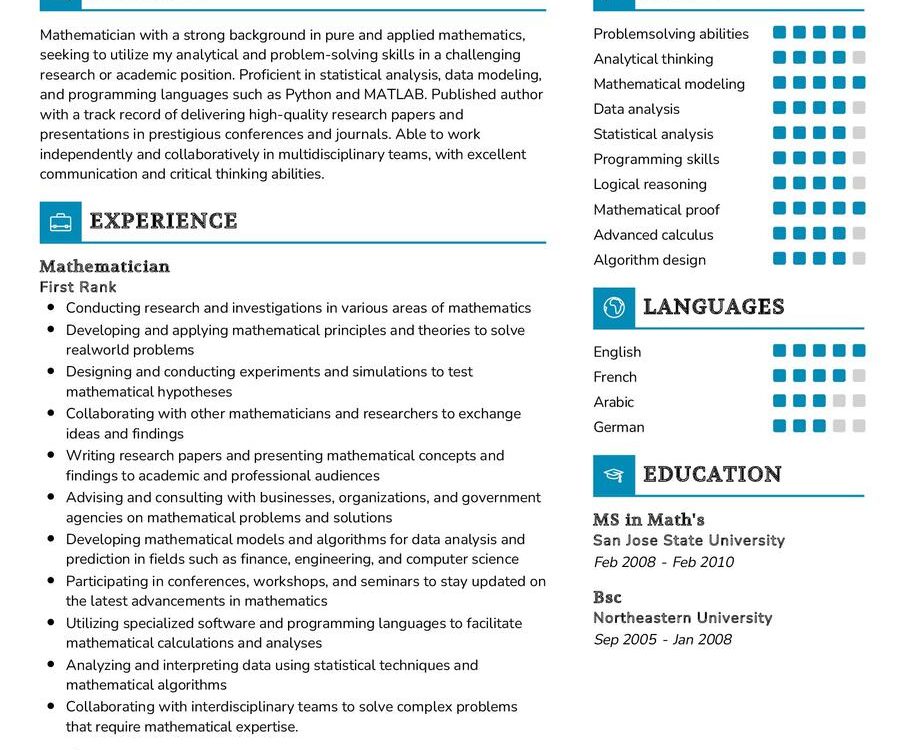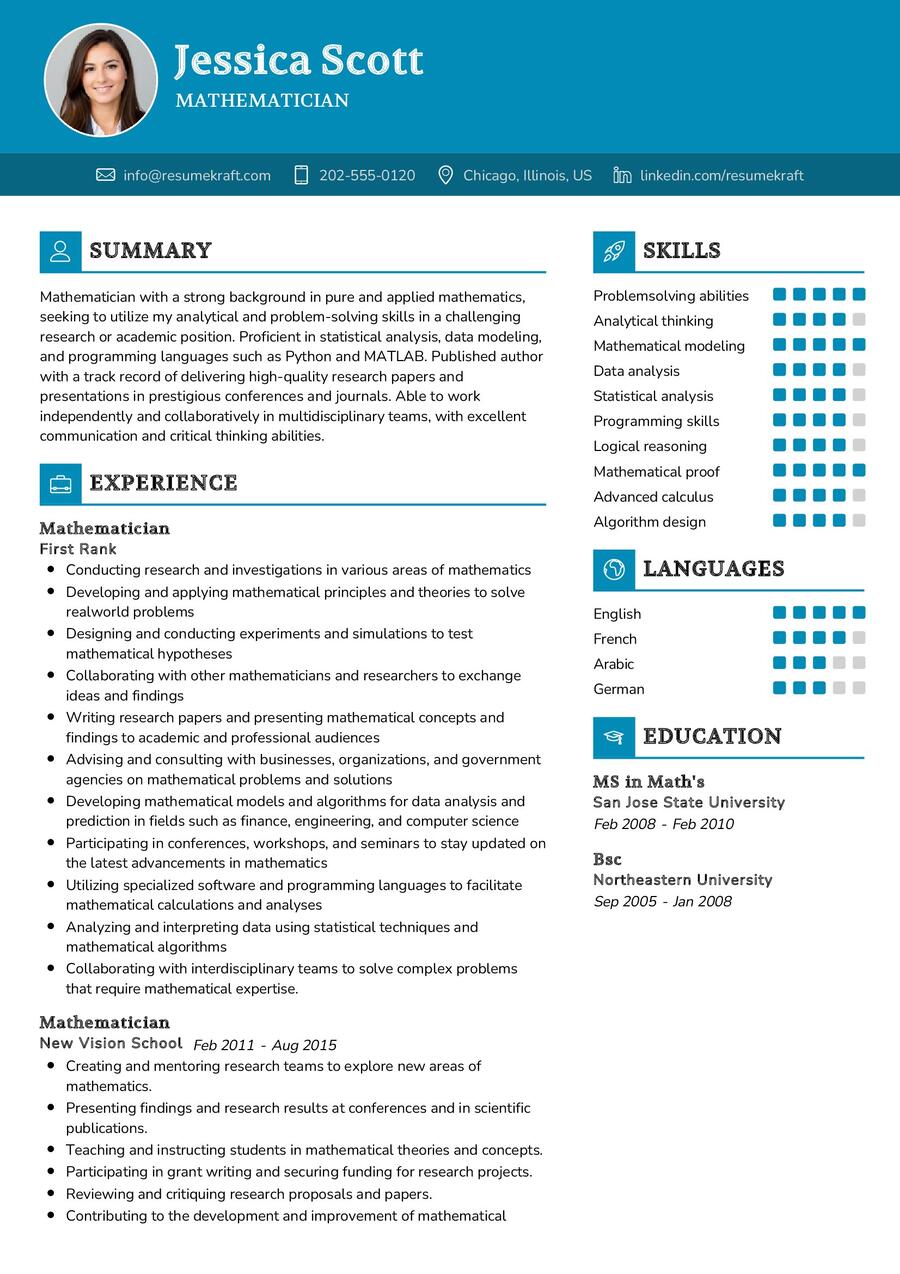Unlocking Success: The Role of a Mathematician
In the dynamic world of numbers, the role of a Mathematician stands as a cornerstone for solving complex problems, making informed decisions, and driving innovation. A Mathematician’s journey is a blend of analytical prowess and a passion for unraveling the mysteries hidden within mathematical structures. Let’s delve into the multifaceted world of being a Mathematician, a profession that goes beyond just numbers.
What Defines a Mathematician?
Mathematicians play a pivotal role in various industries, utilizing their skills to analyze data, create algorithms, and solve real-world problems. The responsibilities of a Mathematician go beyond the stereotypical image of someone solving equations on a chalkboard. Let’s explore the key facets that define the role:
- Data Analysis: Mathematicians are adept at analyzing large sets of data, extracting meaningful insights, and providing valuable information for decision-making.
- Algorithm Development: They create and optimize algorithms, enabling computers to perform complex calculations efficiently.
- Problem Solving: Mathematicians tackle real-world problems across various fields, from finance to technology, using mathematical principles to devise effective solutions.
- Research: Continuous exploration and research are crucial, contributing to the development of new mathematical theories, methods, and applications.
- Communication: Effectively conveying complex mathematical concepts to non-experts is a key skill, facilitating collaboration with professionals from diverse backgrounds.
Being a Mathematician requires not only technical expertise but also the ability to apply mathematical thinking to solve practical challenges.
Qualifications and Skills for Mathematicians
Embarking on a career as a Mathematician involves acquiring a strong educational background and honing specific skills. Here are the prerequisites that pave the way for success:
- A Bachelor’s or Master’s degree in Mathematics or a related field, showcasing a solid foundation in mathematical concepts.
- Proficiency in programming languages such as Python or MATLAB, essential for implementing algorithms and conducting computational analyses.
- Strong analytical and critical thinking skills, enabling Mathematicians to approach problems with a systematic and logical mindset.
- Effective communication skills, allowing Mathematicians to collaborate with interdisciplinary teams and present findings to non-experts.
- Research experience and a curious mindset to explore new mathematical territories, contributing to the advancement of the field.
- Adaptability to emerging technologies and a commitment to continuous learning to stay abreast of advancements in the mathematical landscape.
Securing additional certifications in specialized areas of mathematics can enhance one’s profile and competitiveness in the job market.
Roles and Responsibilities of Mathematicians
The day-to-day responsibilities of Mathematicians vary based on the industry and specific job roles. Let’s unravel the core duties that define the journey of a Mathematician:
- Financial Modeling: Mathematicians in finance use their skills to develop models for risk assessment, investment strategies, and financial forecasting.
- Statistical Analysis: In fields like healthcare or market research, Mathematicians employ statistical methods to analyze data, identify trends, and make informed predictions.
- Algorithmic Research: Mathematicians working in technology focus on developing and optimizing algorithms for applications such as artificial intelligence, machine learning, and cryptography.
- Education: Some Mathematicians choose a career in academia, contributing to the field through teaching, mentoring students, and conducting research.
- Consulting: Mathematicians may work as consultants, providing expertise to businesses seeking mathematical solutions to operational challenges.
The versatility of a Mathematician’s role makes it an exciting and ever-evolving profession.
Crafting a Winning Mathematician Resume
Your resume is your mathematical equation for success in the job market. Here are tips to ensure it stands out:
- Highlight your achievements, showcasing instances where your mathematical expertise led to tangible outcomes.
- Detail specific projects you’ve worked on, emphasizing the impact they had on the organization or industry.
- Quantify your achievements with numbers, providing a clear picture of your contributions.
- Include relevant coursework or research projects that demonstrate your depth of knowledge in specific mathematical domains.
- Customize your resume for each application, tailoring it to the specific requirements of the job.
Your resume is your formula for success; make sure it reflects your unique strengths as a Mathematician.
Mathematician Resume Summary Examples
Your resume summary is the equation that sums up your professional journey. Here are some examples to inspire you:
- “Dedicated Mathematician with a Master’s in Mathematics and a proven track record in financial modeling, contributing to a 15% increase in investment returns.”
- “Experienced Mathematician skilled in algorithm development, applying mathematical principles to enhance machine learning algorithms for real-world applications.”
- “Passionate Mathematician with expertise in statistical analysis, driving data-driven decision-making in healthcare research projects.”
Your summary is the first step in showcasing your mathematical prowess; make it count.
Experience Section for Your Mathematician Resume
Your experience section is the proof of your mathematical journey. Here are examples to guide you:
- “Led a team of data scientists in developing predictive models for stock market trends, resulting in a 25% improvement in investment portfolio performance.”
- “Contributed to the development of an innovative algorithm for image recognition, enhancing the accuracy of facial recognition systems by 20%.”
- “Collaborated with healthcare professionals to analyze patient data, providing statistical insights that influenced treatment protocols and improved patient outcomes.”
Your experience section is where your mathematical achievements come to life; showcase them proudly.
Education Section for Your Mathematician Resume
Your educational journey is the foundation upon which your mathematical expertise stands. Here’s how to list your educational milestones:
- Master of Science in Mathematics, XYZ University, a journey of deep learning and specialization, 2018.
- Bachelor of Science in Applied Mathematics, ABC University, the foundation stone of your mathematical career, 2014.
- Certified Data Science Professional, recognizing your skills in applying mathematical concepts to real-world data, 2019.
Each educational qualification is a stepping stone, leading you to the pinnacle of success in your mathematical career.
Mathematician Skills for Your Resume
Your skill set is your toolkit, equipped with a diverse range of mathematical tools that you have honed over the years. Let’s list down the essential skills that a Mathematician should possess:
Soft Skills:
- Analytical thinking, the ability to break down complex problems into manageable components.
- Effective communication, conveying mathematical concepts to both technical and non-technical audiences.
- Attention to detail, ensuring accuracy in mathematical computations and analyses.
- Curiosity and creativity, driving exploration and innovation in the field of mathematics.
- Adaptability, staying current with advancements in mathematical theories and applications.
Hard Skills:
- Programming languages: Proficiency in languages such as Python, MATLAB, or R for algorithm development and data analysis.
- Statistical modeling: Expertise in statistical methods for data analysis and decision-making.
- Problem-solving: The ability to apply mathematical principles to solve real-world problems.
- Research skills: Conducting in-depth research to contribute to the field’s knowledge base.
- Mathematical modeling: Developing and optimizing mathematical models for various applications.
Each skill is a tool, aiding you in solving mathematical challenges and leading your team effectively.
Common Mistakes to Avoid in a Mathematician Resume
As you craft your resume, steer clear of common pitfalls that can hinder your journey to landing your dream job. Here are mistakes often seen in resumes and how to avoid them:
- Avoid using overly technical language that may alienate non-mathematical professionals reviewing your resume.
- Highlight your achievements and the impact of your work, not just the technical aspects of your projects.
- Include a cover letter to provide a narrative of your mathematical journey and connect with potential employers.
- Ensure your resume is error-free, as mathematical precision extends to the presentation of your professional image.
Avoid these mistakes to craft a resume that is both authentic and compelling, showcasing your unique value as a Mathematician.
Key Takeaways for Your Mathematician Resume
As we conclude this comprehensive guide to crafting a Mathematician resume, remember these key takeaways:
- Emphasize your ability to apply mathematical principles to solve real-world challenges.
- Showcase the impact of your work through quantifiable achievements and results.
- Highlight your versatility by illustrating how your mathematical skills are applicable across different industries.
- Express your commitment to continuous learning and staying abreast of advancements in the field.
Your resume is your mathematical formula for success; make it precise, impactful, and uniquely yours.
Finally, feel free to utilize resources like AI Resume Builder, Resume Design, Resume Samples, Resume Examples, Resume Skills, Resume Help, Resume Synonyms, and Job Responsibilities to create a standout application and prepare for the Mathematician job interview.
Armed with these insights and tips, you are now ready to craft a resume that is a true reflection of your mathematical journey, your skills, and your aspirations. Best of luck!


